Chairman’s Report for July 14, 2017
In this issue of the newsletter
New: Report from Iraq: Threats at Christian IDP compound – “must be cut”
New: Four camps for displaced Christian families visited – Diapers distributed
New: Downtown Erbil – Christian women cannot go into street alone
New: Small Christian IDP camp needs more than 47,000 gallons of water per month
Part 1: Report from Iraq: Diaper distribution
Jihadists threaten compound: The first June distribution for Diapers for Refugees was scheduled for June 16th and I was there at 9:00 AM despite not arriving from Amman, Jordan until 3:30 AM that same day. I was greeted with a threat.
The first distribution was set at the Ozal compound that from the outside looks like a nice suburban neighborhood of attached homes, similar to what we call townhomes. But it is far from normal, as up to five Christian families live in each house. It was in this compound that one of our first Christmas for Refugees events was held in Iraq three years ago.
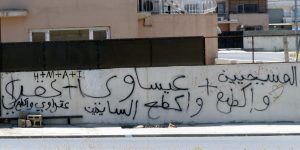 As our trucks entered the camp I noticed spray painted graffiti on the external wall. The Arabic was clear. It said: “Christians and Christ men must be cut.” The term “Christ men” refers to preachers and priests, and the word used for “cut” clearly means beheading. That was the greeting I received on my first full day back in Iraq to take aid to the persecuted Christians there.
As our trucks entered the camp I noticed spray painted graffiti on the external wall. The Arabic was clear. It said: “Christians and Christ men must be cut.” The term “Christ men” refers to preachers and priests, and the word used for “cut” clearly means beheading. That was the greeting I received on my first full day back in Iraq to take aid to the persecuted Christians there.
The outward appearance of the area is one of serenity, although I doubt that inside the homes there is much serenity, with several families living in each house and using the same kitchen and bathroom. All construction stopped on these homes when the ISIS army got to within 25 miles of Erbil, and some churches have been able to rent them for the refugees’ use.
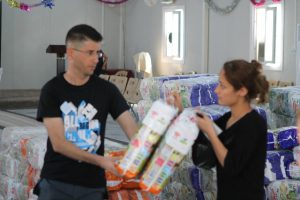 There are many volunteers for the Diapers for Refugees program. Many of the men who escaped with their families from the Nineveh Plain and Mosul have no work, and they do what they can to help. There is no shortage of labor to unload trucks or set up areas for distribution. On some occasions, husbands or grandmothers pick up the diapers for busy mothers.
There are many volunteers for the Diapers for Refugees program. Many of the men who escaped with their families from the Nineveh Plain and Mosul have no work, and they do what they can to help. There is no shortage of labor to unload trucks or set up areas for distribution. On some occasions, husbands or grandmothers pick up the diapers for busy mothers.
Over the past year sanitary pads for the mothers and adult diapers for special needs elderly have been added to the program. The women are particularly thankful for the sanitary pads which are costly when not bought wholesale.
While the need for the adult diapers is not acute, there are some in the camps that do require them. Many times, elderly women are too embarrassed to request these and a daughter or son will bring her ID to the distribution to obtain them.
We purchase 160,000 diapers every three months from a supplier in Dohuk, Iraq which is about a two-hour drive from Erbil. Dohuk is a major city with a metropolitan population of well over one million and it is a distribution hub for goods manufactured in Europe and Turkey. The diapers we purchase are of a high quality and are made in Turkey.
The entire three-month supply is not delivered to a family at one time for several reasons including the ability to carry them home, and the fact that the children grow and needs can change from month to month. The diapers are kept in a dedicated sea-going container that has been converted for warehouse use.
Our program shares a warehouse area that is literally made up of containers stacked up on each other. Fortunately, our container is on the bottom and easy to load and unload. The diapers are all stacked by size in the container leaving a walkway to unload the appropriate sizes for each distribution. Distributions are done monthly at several different camps.
My observations of the June diaper distribution in Iraq
Distribution at four camps in June: During my inspection trip to Iraq, diaper distribution occurred at four locations. The camps served were:
Ozal Compound Nineveh Plain Christians Diapers / Sanitary pads / Baby food
Kanjan Compound Nineveh Plain Christians Diapers / Sanitary pads / Adult Diapers
Ashti2 Camp Nineveh Plain Christians Diapers / Sanitary pads / Adult Diapers
Rock Compound Nineveh Plain Christians Diapers / Sanitary pads / Adult Diapers
Several videos of the distribution are posted at www.Diapers4Refugees.org and our Facebook page for Diapers for Refugees.
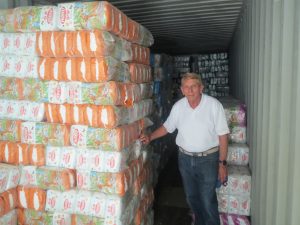
Chairman William Murray traveled to Iraq to help with the diaper deliveries and distributions in June.
Of all the camps, the Ozal compound is one of the more unique. This is the compound where threats had been written against Christians on the wall at the entrance. Inside, the compound looks like a middle class residential area as I mentioned above. There are children on bikes and a few cars parked on the street. During the day when temperatures are well over 100 degrees there are few people on the streets.
Americans expect to see photos of people sitting in the dirt outside of a tent. Iraq is NOT a third world nation. Before the 2003 war it was a nation of divided highways and modern cities. Much of that was destroyed in the war — and then in the near civil war of 2006 after an initial pull-out of US troops. Things got better after President Bush did a “surge” of troops, but then came the Islamic State rampage in 2014. The goal of the Islamic State of course was to take Iraq and Syria back to the 6th century with “pure” Islam. The only “modern” things Jihadists are interested in are weapons of war.
The churches and Christian missions have done their best to normalize life for the many thousands of Christians displaced from their homes. That is what the diaper program is about – normalizing life for Christians as Iraq is rebuilding, even in a time of continuing war. Sadly, Christians are being left out of the rebuilding process.
The largest diaper distribution was at the Ashti2 camp in Ankawa, because it is the most concentrated. The compound is made up of hundreds of caravans that are 12 x 22 feet. The inside of each caravan contains just 264 square feet, divided into two spaces. One is a bedroom/living room for the entire family. About a fourth of the area is a small toilet and kitchen area with a partition. Up to eight family members live in one of these caravans, but the average family size is five.
An untrained eye looking at the caravans would think that they are air conditioned, but that is not the case. To cool the individual units, a sort of vaporizer is used. A hose from a water supply feeds cool water into the unit and then air is blown across or through it into the caravan. It is primitive, but compound generators would never be able to supply hundreds of air conditioning units
On days of extreme heat, I have seen men bringing a block of ice to their caravan. The ice is then placed in front of a small fan in an attempt to cool the caravan for their families.
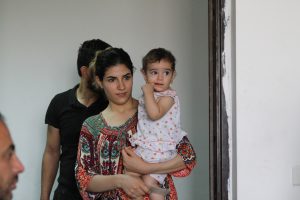 At the Ashti2 compound we delivered diapers to 330 families. Hundreds more families live there, but they do not have diaper age children.
At the Ashti2 compound we delivered diapers to 330 families. Hundreds more families live there, but they do not have diaper age children.
The families in the compounds are desperate since most of the men are unemployed, and some will sell whatever they can get their hands on at the street stands. The diapers would bring needed cash to families if sold on the black market. For that reason, extreme care is taken to make sure that the families needing diapers receive them. We do not back up our truck and start handing out diapers to anyone that shows up.
A list is prepared in advance of families needing diapers, from information obtained from the camp administrator. All family members who come on site to pick up the diapers must show their ID as well as the child’s ID.
This is the same procedure used by all NGO’s to make sure that desperate people do not take what is being passed out — and then get back into the line again. It also stops panic among the families who may fear that the supply of whatever is being distributed may run out. A compound or camp such as Ashti2 is always in a process of change. Some men manage to find jobs and move their family out, sometimes to another city. But new families from West Mosul that had been held captive by the Islamic State are just now arriving. And some women are wearing black from head to toe because their husbands who were fighting in the Iraqi Army have been lost.
The Rock Compound: The Rock is actually neither a compound nor a camp. It is three stories of an office and shopping complex in downtown Erbil near the Citadel. This building complex, which covers two city blocks, is owned by a Christian businessman. There are several hundred families living in partitioned off spaces, again about the size of a caravan. Diapers were distributed to 90 families at this location. Parking and unloading is a huge issue. Although we prepositioned the diapers the night before, it took us nearly 45 minutes to find parking and make it up to the location.
In Ankawa, which is a Christian town adjacent to Erbil, the women and teenage girls can safely go out by themselves. However, in downtown Erbil, no Christian woman can go onto the street by herself unless she compromises her faith and wears a hijab. The Kurds are Sunni Muslims, and right now the Trump Administration and the media pump them up as true heroes and our great paid warriors against Islamic State. They are Sunni Muslims — not as radical perhaps as the Islamic State, but still, Christian restaurants were forced to pay a fee to stay open during the time of Ramadan when I was there in June.
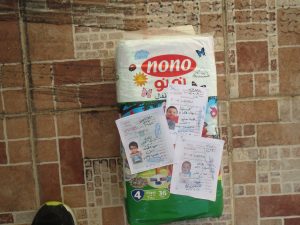 The Qaraqosh Distribution: The last time I was in the Christian town of Qaraqosh, Iraq in late 2016, there were no families living there as yet. By May, we had word that 345 families had moved there. By the time I arrived in Iraq the number had changed to 200. The living conditions are horrid, even though running water has been reestablished. Can you image living in a home with broken out windows in a neighborhood destroyed by war — with no neighbors for perhaps a block or more?
The Qaraqosh Distribution: The last time I was in the Christian town of Qaraqosh, Iraq in late 2016, there were no families living there as yet. By May, we had word that 345 families had moved there. By the time I arrived in Iraq the number had changed to 200. The living conditions are horrid, even though running water has been reestablished. Can you image living in a home with broken out windows in a neighborhood destroyed by war — with no neighbors for perhaps a block or more?
In Qaraqosh, diapers were delivered to those families who needed them. In addition, all of the 200 families were given two large heavy plastic bags each – one filled with food items and one with hygiene items. All items are top quality and known brands. Separately, a 4.5 kilo (9.9 pounds) bag of rice was also distributed. The bags of food contained staple items such as beans, sugar, salt, baking mix, coffee and cooking oil. The hygiene package contained detergent, soaps, shampoos, tooth paste and brushes, as well as razors for the men and sanitary pads for the women. Multiply what you see by 200 … plus the diapers, and we needed two trucks.
Diaper deliveries to various camps and compounds are monthly. The diapers are purchased in bulk every three months. In all, 640,000 diapers per year are distributed.
Journey to Dohuk: My June mission to Iraq did not end at Qaraqosh. At the end of the day, on the way back from Qaraqosh to Erbil, I was dropped off at the Karak Bridge. There, a driver from the Assyrian Aid Society picked me up and drove me to Dohuk, Iraq. That took about two hours but placed me where I needed to be. There are about 5,000 Internally Displaced Christian families (IDP’s) in Dohuk Province. Many would like to try to return to their homes but are being blocked from returning by the Kurdish Peshmerga. To be continued.
William J. Murray, Chairman
Religious Freedom Coalition, 601 Pennsylvania Ave. NW #900, Washington, DC 20004 * (202) 742-8990

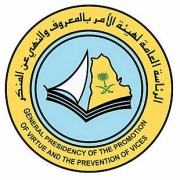
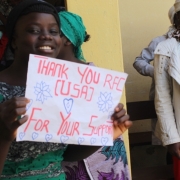
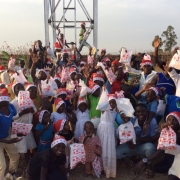
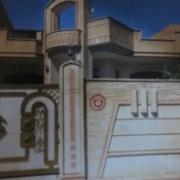
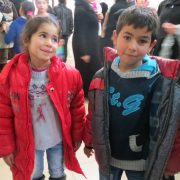
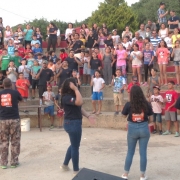
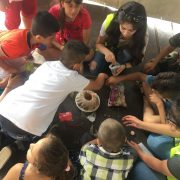
Leave a Reply
Want to join the discussion?Feel free to contribute!